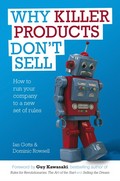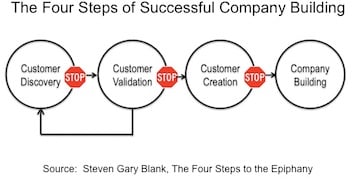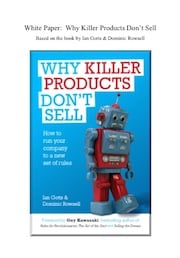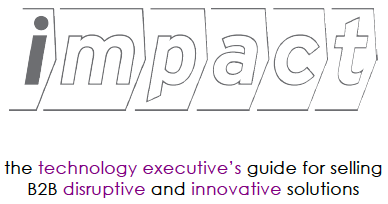Working with a number of VC's over the past 5 years, I have completed several sales due-diligence assignments. I've developed a healthy respect for the experience, insight and skill that VC's invest in due diligence, prior to making a decision to fund an early stage company.
Most VC's will see more than 100 opportunities a year and invest in a handful, representing the combination of best teams, best products, great business cases and a market receptive for the products.
Ask any VC about their portfolio; most will tell you they have a couple of stars, a whole bunch that are mediocre performers and a few that are dying or that they will wind-up.
Is this Darwinian or the hidden hand of some great technology creator?
What happened to that great investment?
If the due diligence was correct and the product works and there is a market, how come there are so few stars and so many companies struggling to win new accounts after the founders handed over the selling to the professionals?
What if anything can be done about it?
Our business is in improving the performance of early-stage and mid-sized technology companies through aligning sales and marketing messaging around the buyer; creating transparency in sales process; and in teaching people to sell consultatively and to disrupt status-quo thinking.
I was delighted to find and read in
"Why Killer Products Don't Sell"by IanGotts and DominicRowsell, a clear and logical explanation of why so many early-stage companies get it wrong.
Symptoms of a problem?
On an assignment in an early-stage software company last week, with the book fresh in my mind, was not surprised to learn they had hired and fired 5 sales people in the prior 3 years - none of them could sell their product.
There are no competitive products with the same functionality; the founders are still making sales and stress levels are high.
It's a big-ticket product/consulting sale into mobile-operators and requires industry knowledge and contacts, product knowledge, product-usage knowledge, skill in managing the people involved in the decision cycle and most importantly - patience.
So many companies with novel products make the same mistake. It goes something like this; - after the founders have made the first few sales, the owners decide
it's time to hit the gas. They raise a funding round to ramp sales against an aggressive target; hire a sales director and team of proven sales professionals.
WARNING!
Did anyone specify these sales people will look more like consultants; that they need early-stage or start-up experience; are comfortable calling-high and having business conversations with senior execs about their problems (consultative selling).
In addition, are they capable are of guiding the buyer to envision how they could achieve success using the product and then
leading the buyer through their own internal machinations in order to reach a decision and start the buying process?
According to authors IanGotts and DominicRowsell, symptoms of the problem are:
- Sales are stalled, you generate plenty of interest, but mainly educate
- Numerous pilots, but no pull through
- Big deals keep slipping from one quarter to the next (value-created customer buying cycles have no connection to the quarterly revenue problem)
- You run out of mates and technology enthusiasts to sell
- Small incremental sales, but no large follow-on orders
- You confuse your customer and you have internal arguments about whether you are a consulting company or a product company...(this is irrelevant, to your customers you are a product company).
....does any of this sound familiar?
A Process for Managing the "Value Created" Buying Cycle
One very clear message from the book for VC's and leaders of early-stage companies is to understand and align with the buying behavior of their customers.
"The value-created buying culture occurs when the customer senses there is an opportunity, but can't describe it. It takes the supplier to bring it into clear focus and suggest a solution."
Authors Ian Gotts and Dominic Rowsell have created the IMPACT model, which accurately describes the process of how all companies buy.








